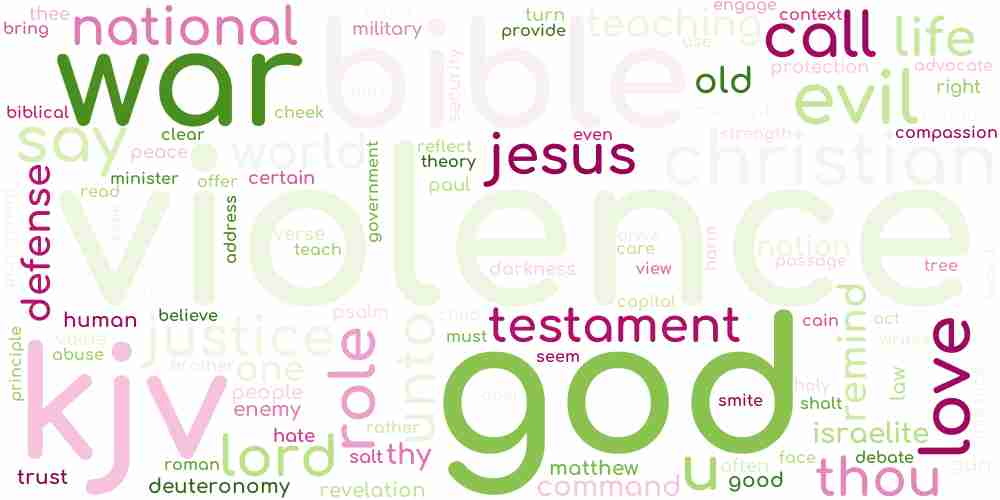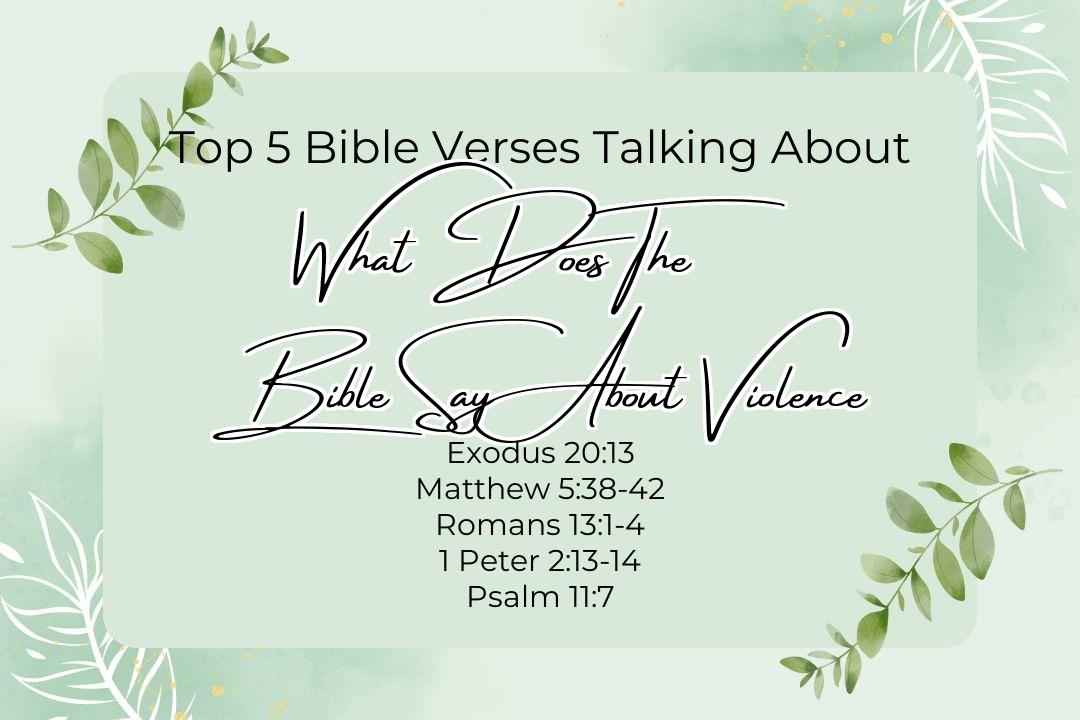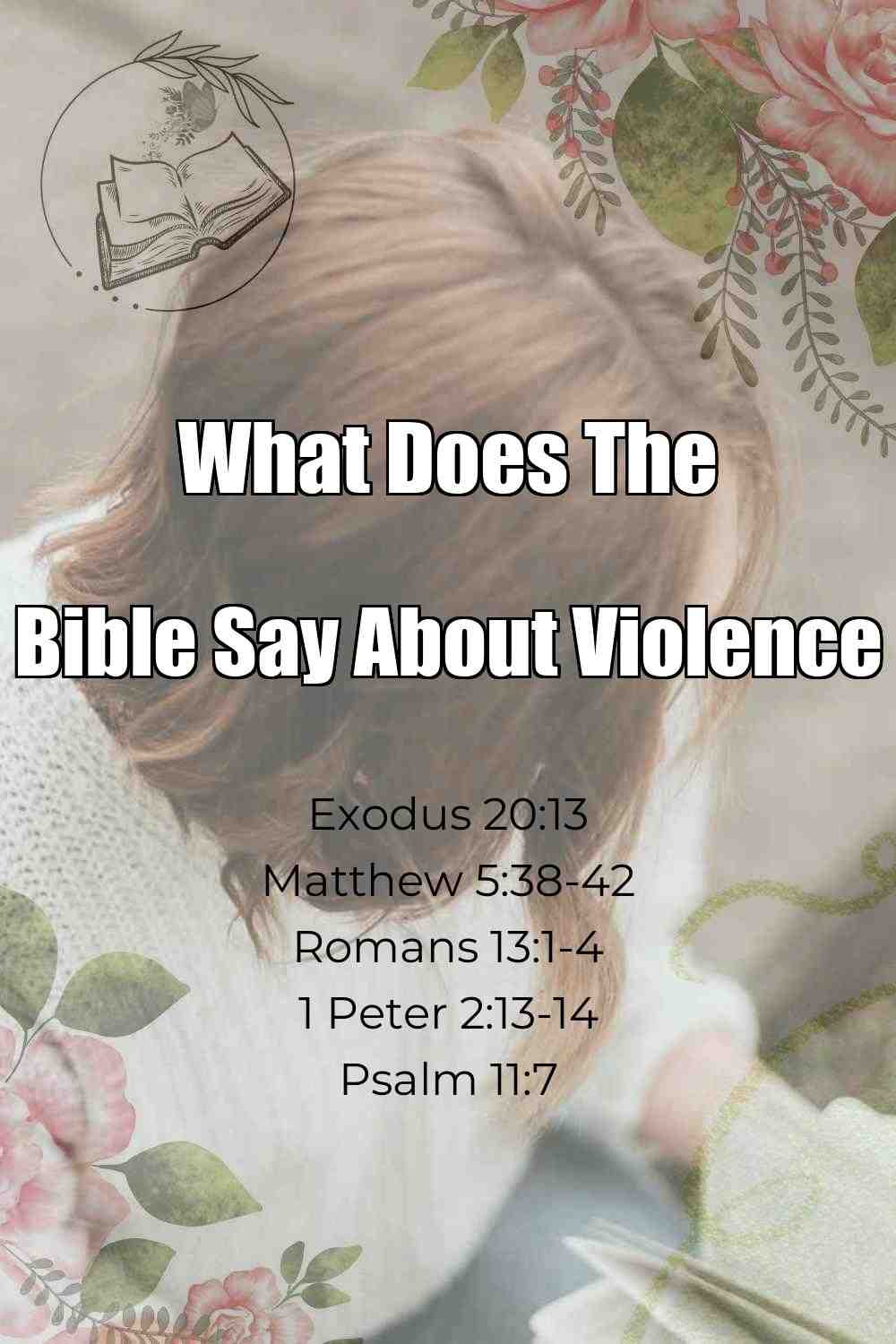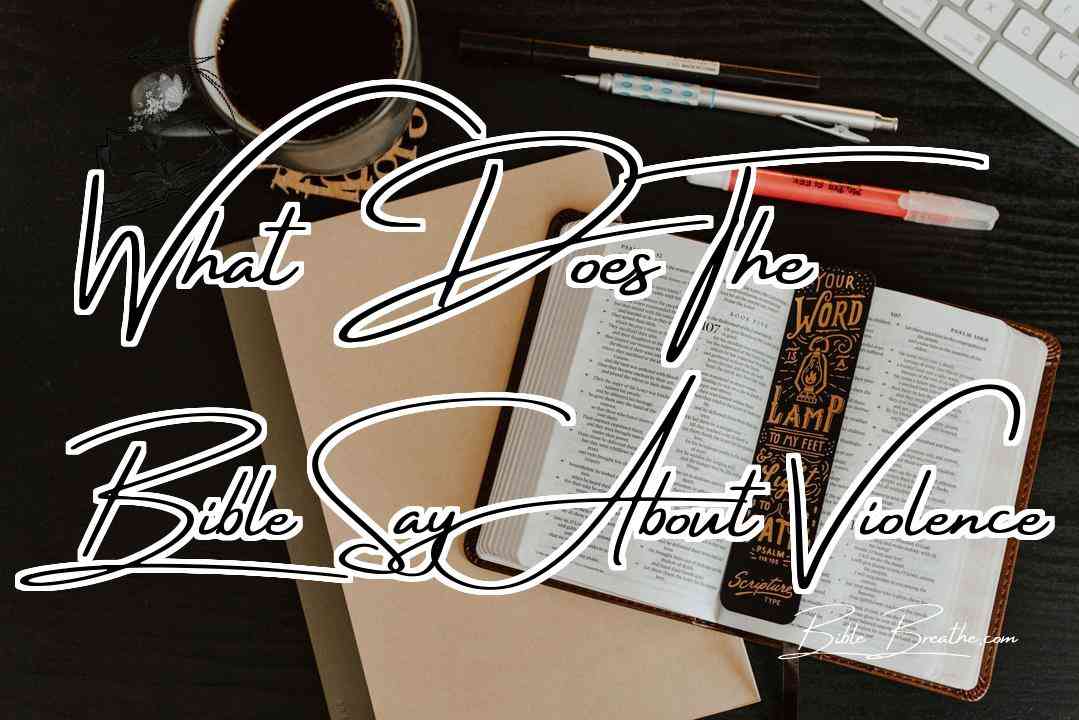I find myself questioning God’s take on all the violence we’re seeing lately. The Bible’s stance on it is kinda murky – does it really say it’s okay, or is there another way to look at it? Having grown up with stories of wars in the Old Testament, it’s weird now to reconcile that with Jesus’ whole thing about turning the other cheek – so, like, what’s the deal with all that, and how am I supposed to apply it to, say, the international conflicts we’ve got going on today?
Key Takeaways
- I’ve come to realize that, according to the Bible, violence isn’t the solution to our problems – instead, we’re encouraged to pursue peace and resolve conflicts through love and forgiveness, as seen in Matthew 5:38-42 and Romans 12:17-21.
- When reading the Old Testament, I noticed God instructed the Israelites to use force in specific situations, like self-defense or punishing evil (check out Exodus 22:2-3 and Deuteronomy 19:16-21), but it’s crucial to remember that God’s guidance and control were always part of the equation.
- For me, the New Testament makes it clear: don’t turn to violence. Rather, love your enemies, and pray for those giving you a hard time – that’s what Matthew 5:44 and Luke 6:27-36 say, at least.
- As I see it, the Bible suggests that our affinity for violence stems from our fundamentally flawed nature (look at Genesis 6:11-13 and 8:21); only through God’s intervention and transformative power can we overcome our violent impulses.
- The way I understand it, the Bible ultimately envisions a future where God eliminates violence altogether, ushering in a kingdom of authentic peace and harmony – Isaiah 2:4, 9:6-7, and Revelation 21:1-4 give us a glimpse of that promise.
Here’s a visual summary of our topic, captured in this word cloud.

Word cloud by BibleBreathe.com about what does the bible say about violence word cloud
Top 5 Bible Verses About What Does The Bible Say About Violence
Personally, I find these Bible verses super helpful in grasping the whole concept. The verses I’ve picked out, I reckon they give you a bit more to think about, and some extra context. When trying to wrap my head around this stuff, I like to refer back to these. They kinda offer a richer view of what’s going on.

Picture by BibleBreathe.com about What Does The Bible Say About Violence
Old Testament Perspectives on Violence
Honestly, I still struggle to wrap my head around the Old Testament’s portrayal of violence – it’s like, way more complicated than people make it out to be. See, on the one hand, there’s this whole concept of holy war, which I guess is when God tells the Israelites to go to war against certain countries.
“And when the Lord thy God hath delivered it into thine hands, thou shalt smite every male thereof with the edge of the sword” (Deuteronomy 20:13, KJV)
My take on this? Well, God didn’t just randomly decide to destroy certain nations – those nations had done some seriously messed up stuff, like sacrificing their own kids and worshipping idols and whatnot. I’m starting to see it more like, God had had enough of their atrocities, so He chose to use the Israelites as His means of punishing them.
The Role of Violence in the Conquest of Canaan
Okay, fast forward to when the Israelites are about to take over Canaan, and God basically tells them to kick the Canaanites out of their own land. At first, I was all, “Wait, this is just cruel and unfair.” Yet, the thing is – the Canaanites had been warned tons of times to stop being so wicked, and they straight up refused to listen.
“For the wickedness of these nations the Lord doth drive them out from before thee, and that he may perform the word which the Lord sware unto thy fathers, Abraham, Isaac, and Jacob” (Deuteronomy 9:5, KJV)
Here’s the thing – God wasn’t just about destroying people for no reason; He genuinely wanted a special people who weren’t stuck in all these horrific sin patterns like the nations around them were.
The Laws of War in Deuteronomy 20
Let me raise a point about Deuteronomy 20’s rules for war – now those were some serious guidelines the Israelites needed to follow in battle. Before anything else, they had to offer peace to the enemies; not just that, they were also to let the women and kids go free, and leave trees and buildings intact whenever possible.
“When thou comest nigh unto a city to fight against it, then proclaim peace unto it” (Deuteronomy 20:10, KJV)
It blows my mind just how…modern this sounds, to be real. Back in the ancient days, war was just a free-for-all gore fest, but here’s this principle of showing compassion even while you’re, well, literally fighting for your life. At the end of the day, it really feels like, we can learn from this complex mixture of mercy, compassion, and fairness when dealing with any kind of violence and bring that understanding into our Christian walks.
New Testament Teachings on Violence
Jesus’ Teachings on Non-Violence and Love of Enemies
Reflecting on what the Bible says about violence always gets me thinking about Jesus and his pretty radical ideas on love and non-violence. He puts it straightforward,
“But I say unto you, Love your enemies, bless them that curse you, do good to them that hate you, and pray for them which despitefully use you, and persecute you” (Matthew 5:44, KJV).
I mean, it’s not just a suggestion – he’s actually commanding us to love those who might be trying to hurt us, which, honestly, can be super hard to do; yet, if we manage to pull it off, it could bring some real transformation into our lives and the lives of people around us. martin Luther King Jr. said it pretty well, “Darkness cannot drive out darkness; only light can do that. Hate cannot drive out hate; only love can do that.”
The Apostle Paul’s Views on the Role of Government and Violence
When Paul writes to the Romans, he gets into the role of government and violence. Here’s what he says,
“For he is the minister of God to thee for good. But if thou do that which is evil, be afraid; for he beareth not the sword in vain: for he is the minister of God, a revenger to execute wrath upon him that doeth evil” (Romans 13:4, KJV).
There’s been a lot of debate on this passage among scholars, but I think it’s clear Paul thinks government plays a part in keeping order and justice, even if it involves using force. Just ’cause that’s the case, though, don’t think for a sec we’re justified in taking the law into our own hands or engaging in violent behavior ourselves.
The Book of Revelation’s Depiction of Violence and God’s Judgment
The book of Revelation’s got some pretty jarring images of violence and God’s judgment – I mean, some people interpret these parts as basically saying violence is okay, or even that they’re some kind of literal call to arms. Not me, though – I reckon these parts are symbolic, representations of God ultimately triumphing over evil and darkness. This part in Revelation 19:15, for example,
“And out of his mouth goeth a sharp sword, that with it he should smite the nations: and he shall rule them with a rod of iron: and he treadeth the winepress of the fierceness and wrath of Almighty God” (Revelation 19:15, KJV).
To my mind, the violence we see in Revelation isn’t something to be emulated – more a wake-up call to what happens when we reject God’s love and redemption.
The Bible’s Take on Self-Defense and Protecting Myself

Photo modified by BibleBreathe.com. Original photo by Aaron Burden on Unsplash
Can I Defend Myself, According to the Old Testament?
As I flip through the Old Testament, it seems to me like the Bible doesn’t really explicitly come out against defending yourself.
Like in some cases, God’s people are basically told, hey, it’s okay to protect yourself if someone’s trying to hurt you.
“If a thief be found breaking up, and be smitten that he die, there shall no blood be shed for him.” (Exodus 22:2, KJV)
So, if someone’s breaking into my house, this verse kinda implies that defending myself or my stuff isn’t just okay – it’s actually justified, in some cases.
Still, I think it’s super important to remember that this whole self-defense thing isn’t, like, a free pass to just go around whaling on people.
Jesus’ Teaching on Turning the Other Cheek
When I look at Jesus’ teachings, things get a little more complicated.
Like in that Sermon on the Mount, Jesus is all:
“But I say unto you, That ye resist not evil: but whosoever shall smite thee on thy right cheek, turn to him the other also.” (Matthew 5:39, KJV)
At first blush, this kinda seems like He’s saying just roll over and take it.
But what if Jesus is trying to teach me something deeper here – like, maybe turning the other cheek isn’t about being weak, it’s about refusing to play by violence’s rules?
Putting Faith in God’s Protection
As a Christian, I’m called to trust in God’s plan and His protection.
That Psalmist dude writes:
“The Lord is my rock, and my fortress, and my deliverer; my God, my strength, in whom I will trust; my buckler, and the horn of my salvation, and my high tower.” (Psalm 18:2, KJV)
When danger comes knocking or I’m feeling all uncertain, my faith in God’s protection should make me wanna seek refuge in Him, you know – instead of just relying on myself to save the day.
The Bible’s Take on War and National Defense
Just War Theory – is it a thing?
I’m gonna be honest, the more I look into what the Bible says about violence, the more I’m like – what’s the deal with war and national defense? It’s super complicated. Just war theory is this theological framework that tries to make sense of it all. It’s been super debated amongst Christians – some are like, no way, war is never cool, while others are all, sometimes it’s necessary.
So just war theory’s big on not hurting people and all that. And I get it, I mean the Bible does say “love thy neighbor as thyself” (Mark 12:31, KJV). But at the same time, it knows war is a thing and we gotta defend ourselves. Like in Romans 13:1-4, Paul’s all, “Let every soul be subject unto the higher powers… For he is the minister of God to thee for good.”
Can Christians be in the Military?
I mean, what’s the deal with Christians in the military, right? This is something a lot of believers have struggled with throughout history. Some are all, no way, we can’t fight, Jesus said so (Matthew 5:38-48, KJV). Others are more, hey, we can serve, as long as we’re not doing anything sketchy.
I was thinking about this, and I came across this quote from Origen, some Christian guy from the 3rd century: “We Christians are a peaceful race… We do not wage war against our enemies; we pray for them.” It’s like, yeah, we want peace and love, but sometimes there’s war and that’s hard to deal with.
What the Bible Says About National Defense and Security
So what’s the Bible’s take on national defense and security? In Psalm 121:4, it says, “Behold, he that keepeth Israel shall neither slumber nor sleep.” It’s like, God’s got our backs, but at the same time, we gotta do our part. Like in Nehemiah 4:9, they’re all, “And we prayed unto our God, and set a watch against them day and night.”
I’m thinking about these verses and I’m like, yeah, national defense isn’t just about us, it’s about trusting God too. As the Bible says, “Some trust in chariots, and some in horses: but we will remember the name of the Lord our God” (Psalm 20:7, KJV).
The Problem of Evil and Violence in the World
The Origin of Evil and Violence in the Bible
I remember having this curiosity – What do the Bible and its teachings say about the issue of violence, its causes, and how it came about in the first place? The thing is, the Bible literally states that all these evil and violent acts entering our world had something to do with Adam and Eve, and that whole Garden of Eden situation.
“And the Lord God commanded the man, saying, Of every tree of the garden thou mayest freely eat: But of the tree of the knowledge of good and evil, thou shalt not eat of it: for in the day that thou eatest thereof thou shalt surely die.” (Genesis 2:16-17, KJV)
It was as a result of their not listening that we see the very first case of real-life violence: a gruesome one – their own kid, Cain, went and murdered Abel (who’s also their kid, btw) because he was filled with envy and so angry with him.
“And Cain talked with Abel his brother: and it came to pass, when they were in the field, that Cain rose up against Abel his brother, and slew him.” (Genesis 4:8, KJV)
So here, that is literally how evil and violence came to exist, according to Bible scripture. That first recorded violent incident had opened a doorway, letting them into our reality. Things wouldn’t ever be the same, unfortunately.
God’s Response to Evil and Violence
Thing I always wonder – Is God fine with the presence of evil and violence in the world? To find out how He perceives it is actually super hard, but does it get His cosign or stamped out as a totally off thing? That’s pretty ambiguous to the general mindset as well, yet also actually somewhat crystal. I mean it quite clearly state’s in His teaching: His distaste for all forms of ferocity – we shall definitely see those at the recieving end at a point for not leading by way of reasonableness.
“The Lord trieth the righteous: but the wicked and him that loveth violence his soul hateth.” (Psalm 11:5, KJV)
In reality God goes deeper; showing a burning want for fairness, integrity and noble nature; at the opposite end is the evil & the violent: where darkness actually hovers. So who among Christians answers the calls of injustice while seeing it all?
The Role of Christians in Addressing Violence and Injustice
How can Christians answer to ongoing wickedness by being fair and helping the trampled? We gotta give them the light in so deep a darkness since God told ’em our very role is making light the world.
“Ye are the salt of the earth: but if the salt have lost his savour, wherewith shall it be salted? it is thenceforth good for nothing, but to be cast out, and to be trodden under foot of men.” (Matthew 5:13, KJV)
The act would come as no great outburst of help- in real honesty most of that answering just points with a finger against unjust life episodes – also helping those wronged by the system- evil is taken care of not if one isn’t truly doing this role – being who God wants in us – His eyes are the deciding factor – as Christians it falls solely as part to make known to everybody Jesus.
Applying Biblical Principles to Issues of Violence
Domestic Violence and Abuse
I sit here, my mind full of the times God tells us to love and look out for each other. Sometimes when i read bible i feel like he isn’t just asking – its like, he’s telling us. We really gotta love one another.
“Love thy neighbour as thyself” (Mark 12:31, KJV).
Thing is, what happens when the love turns ugly? when its the ones who supposed to care about you that end up hurting you? Bible is super clear – violence in home, thats wrong. thats sin.
“The Lord hateth… hands that shed innocent blood” (Proverbs 6:16-17, KJV).
We gotta know that its never the person getting hurt’s fault – never. We gotta make a safe place for people who getting hurt. help them heal. Christians gotta take responsibility for this.
Gun Violence and Gun Control
We got big problem in this world with gun violence. like, its crazy. as christians we gotta figure out how to even react. Bible does not have all answers, but does tell us how we should think about it.
“Blessed are the peacemakers: for they shall be called the children of God” (Matthew 5:9, KJV).
we should try to make peace, do things that means less people get hurt. that means we gotta try to figure out if guns are too easy to get, if we need more rules, we gotta think about mental health too, and we just gotta be there for people when they hurting.
Capital Punishment and the Death Penalty
death penalty – its a complex one, for real. we christians gotta really think about whats good and whats bad.
“Vengeance belongeth unto me, I will recompense” (Hebrews 10:30, KJV).
yeah bible say death penalty is cool in some cases, but we gotta wonder if thats relevant today. like is it even just? do we need more mercy? christians, we gotta push for love, restoration over punishment.
What Do You Think?
Honestly, I’m super curious – what did you take away from this whole thing? Hit the comments and let’s get the conversation started, I wanna hear your thoughts. Your two cents might just be the thing that helps us dig deeper, you know?
If you’re thinking, “hey, someone else might get a kick out of this,” go ahead and share it, and if you’re looking for more stuff to read, I’ve got plenty of other cool stuff on BibleBreathe.com – check it out!

Photo modified by BibleBreathe.com. Original photo on Unsplash.
Frequently Asked Questions About What Does The Bible Say About Violence
What does the Bible say about violence and self-defense?
Honestly, I think the Bible’s pretty clear on this – we’re meant to love our neighbors, but that doesn’t mean we can’t defend ourselves if we’re in harm’s way (see Exodus 22:2-3). It’s all about finding that balance between protecting ourselves and not, you know, trying to hurt others for the sake of it.
Is violence ever justified in the Bible?
Well, this one’s tricky. On the one hand, the Bible does teach us to love our enemies and all that jazz. But on the other hand, there are times when violence seems kinda… justified, like when David killed that lion to protect his sheep or when Jesus flipped out (literally) in the temple. I guess the key is figuring out the motivations behind the action – are we fighting for what’s right, or just ’cause we’re angry?
What does the Bible say about violence against others?
So I was reading Matthew the other day, and it says we’re supposed to love our neighbors and enemies, and turn the other cheek (Matthew 5:38-42). And get this – God actually hates violence (Proverbs 6:16-19). Plus, Jesus says that even just being angry or hateful can be super destructive (Matthew 5:21-22). So yeah, let’s try to resolve conflicts peacefully, ‘kay?
How does the Bible address domestic violence?
This one’s really important to me. The Bible’s super clear that domestic violence is a no-go. Like, in Ephesians 5:25-33, it says husbands should love their wives like Christ loves the church (which is, you know, a lot). And in 1 Peter 3:7, it says husbands should be understanding towards their wives. If you’re going through abuse, just know you’re not alone, and God sees you. Don’t be afraid to reach out for help – you deserve so much better.
Matt Turner
I’m Matt, and I love breaking down Bible verses in a way that’s easy to understand and apply to everyday life. My goal is to help you connect with God’s Word and find practical ways to live it out. Whether you’re new to the Bible or just looking for some fresh insights, I’m here to walk with you and share what I’ve learned along the way.

